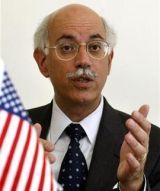Sudan bombing civilian targets in Darfur – US
July 13, 2007 (KHARTOUM) — The Sudanese government has resumed bombing civilian targets in the war-ravaged western region of Darfur, the U.S. special envoy for Darfur said on Friday.
 “After a halt in the bombing between the beginning of February and the end of April in 2007, the Sudanese government has resumed bombing in Darfur,” Andrew Natsios told a news conference in Khartoum following a visit to Darfur.
“After a halt in the bombing between the beginning of February and the end of April in 2007, the Sudanese government has resumed bombing in Darfur,” Andrew Natsios told a news conference in Khartoum following a visit to Darfur.
“This should end and the ceasefire that was agreed to sometime ago should be respected. We urge the Sudanese government to end all bombing in Darfur immediately,” he said.
Khartoum signed a ceasefire agreement with the two main rebel groups in Darfur, the Justice and Equality Movement and the Sudan Liberation Movement, in 2004, but violence has continued.
A May 2006 Darfur peace deal was signed by only one rebel faction and since then rebels have split into a dozen or more groups.
Natsios said the bombing by the Sudanese military focused on the Jebel Marra region, a strong-hold of Abdul Wahid Mohammed Nour, leader of a faction of one of the Darfur rebel groups, and other targets in West and North Darfur.
“I think there were four attacks in Jebel Marra Mountains. We are troubled by this, because these have been stable areas before,” the U.S. envoy said.
“And there had been other bombings I think in West Darfur and North Darfur of civilian targets,” he added.
The Sudanese military could not be immediately reached for comment.
DARFUR REBELS BLAMED
Natsios also criticized rebel groups who he said were “cynically obstructing” a political settlement to the troubles in Darfur.
A peace agreement signed a year ago year between Sudanese President Omar al-Bashir’s government and one rebel group in Darfur has been ineffective because more than a dozen other rebel factions rejected the deal as insufficient and are still fighting.
“All the rebel leaders need to work constructively along with the Sudanese government to facilitate not obstructing the peace process,” said Natsios.
Natsios said Friday that Arab groups from neighboring countries were resettling in West Darfur and other lands traditionally belonging to local African tribes.
“It is very disturbing and provocative,” he said. The migration could create problems when the crisis in Darfur is resolved and the tribes return to settle on their lands.
The U.S. envoy’s comments came as Britain, France and Ghana circulated a draft resolution in the U.N. Security Council for a joint African Union-U.N. force for Darfur, which also threatened force against those who attack civilians, relief workers and obstruct peace efforts.
The resolution, expected to be adopted this month, allows the U.N. to formally recruit troops for the mission.
Under sustained international pressure, Sudan agreed last month to a combined U.N.-AU peacekeeping force of more than 20,000 troops and police to bolster the cash-strapped AU force of 7,000 already operating in Darfur.
The AU troops have failed to stem the violence.
International experts estimate 200,000 people have died as a result of ethnic and political conflict in Darfur since it flared in 2003 when mostly non-Arab rebels took up arms after accusing the central government of neglect.
Washington calls the violence genocide, and blames the government and its allied militia.
Khartoum rejects the term and says only 9,000 have died.
(AP/Reuters)
